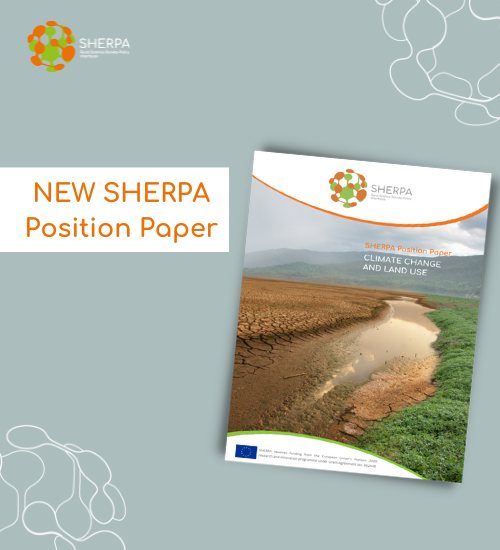
The new SHERPA Position Paper on Climate Change and Land Use is out! This Position Paper builds on the work done by 13 of the SHERPA Multi-Actor Platforms (MAPs) that covered the topic of climate change and land use.
MORE RESILIENT RURAL AREAS
Climate change has direct effects on rural areas, from creating environmental damage to assets and property to increasing natural hazards with an impact on production and disrupting communications.In its EU’s Long-Term Vision for Rural Areas, the European Commission identified the need to support rural areas in tackling climate change and related challenges.
In our Position Paper on “climate change and land use, SHERPA MAPs express their vision, needs, and recommendations to address this challenge. The SHERPA Position Paper underlines the link between climate change and land use transformation in rural areas. As a matter of fact, climate change is leading to land use transformation in Europe. Policies for mitigating climate change are promoting land use transformation towards increased renewable energy generation, woodland expansion, peatland restoration, promotion of carbon-rich soils, and changes in agricultural and land systems.
Yet, rural areas are also at the intersection of many of the frontiers of tackling climate change. They host many energy sources and they can contribute to strengthening renewable energy in Europe. They also provide both potential for economic development in remote rural areas and skill development.
POLICY RECOMMENDATIONS
The SHERPA Position Paper recalls that adequate spatial planning and suitable governance structures are required to ensure mitigation actions. Innovation in planning and governance can facilitate climate transition in rural areas, as well as unlock new forms of product, technological and social innovations.
At all levels, SHERPA recommends policy-makers ensureing unambiguous and long-term goals for tackling climate change, backed by short and medium-term goals. It also calls for policymakers to ensure coherence across spatial scales and existing frameworks (e.g. National CAP Strategic Plans, National Energy Carbon Plans, the European Semester Country Reports, Nationally Determined Contributions).
Place-based approaches should be fostered to design and tailor actions to the needs and characteristics of local areas. To this extent, tools such as participatory budgeting could be deployed to boost community empowerment in climate action. In addition, SHERPA underlines the need to identify sources to fund climate transition and overcome existing legislative barriers.
READ MORE
Discover SHERPA’s views and recommendations in our Position Paper .
Published by Carla Lostrangio